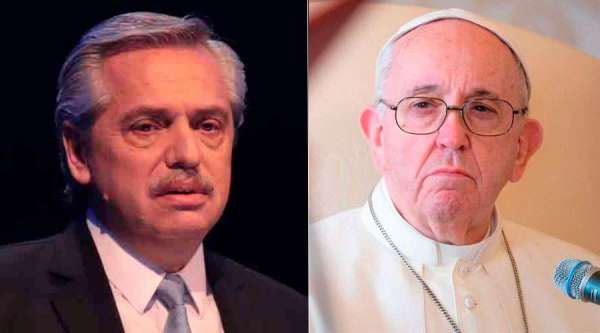The Argentine president hopes that Pope Francis "will not be angry" over the abortion law

Argentine President Alberto Fernández said on Sunday he hopes Pope Francis will not be upset over a bill he introduced into the country's legislature to legalize abortion. The president, a Catholic, said he had to present the bill to solve "a public health problem in Argentina".
Fernández released the statement on November 22 to Argentina's Central Korea television program.
In defense of his position, the president explained “I am a Catholic, but I have to solve a problem in Argentine society. Valéry Giscard d'Estaing is the president of France who approved abortion in France, and the pope at that time asked to know how he was promoting it by being a Catholic, and the answer was: 'I govern many French who do not they are Catholic and I have to solve a public health problem. ""
“This is more or less what is happening to me. Beyond that, however Catholic I am, on the issue of abortion, it seems to me that this is a different discussion. I do not agree very much with the logic of the Church on this issue, ”said Fernández.
The president's reference to a public health crisis seemed to refer to unsubstantiated claims by abortion advocates in the country, claiming that women in Argentina frequently die from so-called "clandestine" or unsafe illegal abortions in the country. In an interview on November 12, Bishop Alberto Bochatey, head of the health ministry of the Argentine Bishops' Conference, disputed these claims.
Pope Francis is an Argentine.
Asked if “the pope will be very angry” about the initiative, Fernández replied: “I hope not, because he knows how much I admire him, how much I value him and I hope he understands that I have to solve a public health problem in Argentina. Finally, the Vatican is a state within a country called Italy where abortion has been allowed for many years. So I hope he will understand. "
"This is not against anyone, this is to solve a problem" and if the abortion law passes, "this does not make it mandatory, and whoever has his religious beliefs, all very respectable, is not obliged to have an abortion," said in justification of the law.
True to the promise of the presidential campaign, Fernández presented the bill to legalize abortion on November 17.
The bill is expected to be discussed by the legislator in December.
The legislative process will begin in the committees of the Chamber of Deputies (Lower House) on General Legislation, Health and Social Action, Women and Diversity and Criminal Law and then move on to a full session of the Chamber. If approved, it will be sent to the Senate for discussion.
In June 2018, the Chamber of Deputies approved an abortion law with 129 votes in favor, 125 against and 1 abstention. After intense debate, the Senate rejected the bill in August by a vote of 38 to 31 with two abstentions and an absent MP.
During the interview, Fernández said his bill would have the necessary votes to pass.
According to the Argentine president, a "serious debate" does not concern "abortion yes or no", but "under what conditions abortions are practiced" in Argentina. Fernández accused the supporters of life of wanting to "continue clandestine abortions". For "those of us who say 'yes to abortion', what we want is for abortions to be performed in proper hygienic conditions," he said.
After Fernández presented his bill, several pro-life organizations announced activities against the legalization of abortion. More than 100 lawmakers created Argentina's Network of Lawmakers for Life to combat abortion measures at the federal and local levels